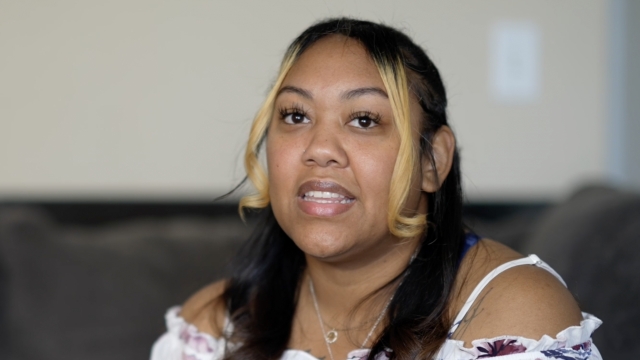Zarah Hilliard says there's no greater joy than delivering the gift of life to hopeful parents.
"When it came to it, I was anxious. But at the end of the day, I was like, this is for a greater cause," she told Scripps News.
She was already a mom when she became a surrogate, navigating pregnancy and delivery again — this time for someone else.
"As soon as he started crying, the dads started crying and then I started crying. So it was really just like intimate," she recalled.
She isn't alone. Recently, celebrities have shared their surrogacy success stories. It's also become a familiar plot in Hollywood.
But that joyful feeling isn't universal — something Hillard learned sharing her journey on TikTok.
"I feel like a lot of negative stuff comes with that. Like a lot of people tell us, you know, 'You're a surrogate, you are going to go to hell,'" she said.
Around the world, Italy, Germany, France, Iceland, Spain and China are just a few of the countries that have banned the practice, citing moral and ethical concerns.
"In the U.S. this is less of a concern, but in other countries you see entire markets and industries created around surrogacy for pay," said Emma Waters, a researcher with the Heritage Foundation.
It's something Pope Francis mentioned in his yearly State of the World address, calling for an international ban, equating the practice to "trafficking" and "exploitation."
Waters says the poor treatment of women is part of what led to international bans.
"They were not paying them fairly and some of the treatment conditions have been really close to what you would imagine a baby farm being. A ton of women packed into a room, living out their pregnancies, giving birth and basically thrown money and sent back home," said Waters.
There are two types of surrogacies: altruistic, in which no money is exchanged beyond medical expenses, and commercial, in which the surrogate is paid for services.
SEE MORE: Michigan's unique surrogacy law causing stress for prospective parents
"Because the agencies play such a large role and there usually is a language barrier and education barrier, a lot of times the women aren't receiving the full amount of money American couples think they are receiving. They are not being treated in the conditions they expected them to be treated in," Waters explained.
A United Nations Human Rights Special Reporter highlighted an "unease" surrounding people from wealthier nations seeking surrogacy from developing countries, underscoring concerning incidents like: convicted sex offenders from Israel and Australia employing surrogates in India and Thailand; the abandonment and sale of "excess" surrogate-born infants; human trafficking of 15 Vietnamese women found and freed by Thai authorities, and the abandonment of an infant born with disabilities in Thailand.
These incidents also stir concerns about the human rights of the children.
During the pandemic, dozens of babies from a surrogacy agency in Ukraine were separated from their intended parents due to travel restrictions. Critics blasted the images of newborns without maternal care — equating the babies to "products." The U.N. report stops short of calling for a ban but recommends stricter protections for children and surrogates. Laws across the U.S. vary when it comes to the rights of all parties.
The American College of Obstetricians and Gynecologists told Scripps News when it comes to safer practices in the U.S., it's important for surrogates to be at least 21, have had a healthy pregnancy and delivery of their own, and completed a mental health evaluation.
The organization also suggests a clear legal contract, boundaries and expectations.
"Making sure that all of the parties, the partners and the intended parents .the families really are on board with all of this makes for more of a smooth sailing situation and a happy outcome for everyone" said Dr. Sigal Klipstein, liaison for the American College of Obstetricians and Gynecologists Ethics Committee.
Dr. Klipstein also explained the importance of a previous successful pregnancy.
"Part of the reason is to make sure that she can carry a healthy pregnancy, but the other issue is that you want to make sure that she's fully aware of what it means to be pregnant," said Klipstein.
Hilliard, who used an American surrogacy agency, feels she was compensated fairly and was given postpartum mental and physical care.
She says she plans to become a surrogate again soon. In the meantime, she and the new parents are planning joint birthday parties. She hopes to stay in the child's life as long as the child is comfortable with it.
"That's one thing that I really wanted to make sure I did in my life was positively change others' lives. Surrogacy has definitely made that happen for me," she said.
Trending stories at Scrippsnews.com




